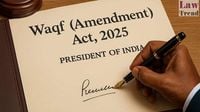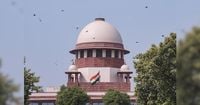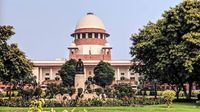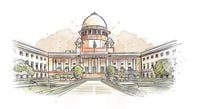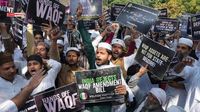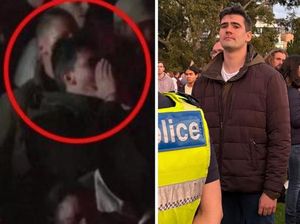The Supreme Court of India commenced hearings today on a significant batch of petitions challenging the constitutional validity of the Waqf (Amendment) Act, 2025. This act, which has sparked widespread controversy, was passed by Parliament earlier this month and has been criticized for allegedly infringing on the religious rights of various communities.
A three-judge bench, led by Chief Justice Sanjiv Khanna and comprising Justices Sanjay Kumar and K.V. Viswanathan, is set to deliberate over 70 petitions that raise concerns about the act's provisions. Senior advocates, including Kapil Sibal, Abhishek Manu Singhvi, and Nizam Pasha, are representing various petitioners, including the All India Muslim Personal Law Board (AIMPLB) and Jamiat Ulema-i-Hind.
During the proceedings, Kapil Sibal articulated the apprehensions surrounding the act, particularly its implications for religious freedom and property rights. He argued that the provisions of the Waqf Amendment Act violate Article 26 of the Indian Constitution, which guarantees every religious denomination the right to manage its own affairs. Sibal stated, “Let me broadly address what the challenge is about. Through a parliamentary legislation, what is sought to be done is to intervene in an essential and integral part of a faith.”
One of the most contentious aspects of the amendment is the introduction of the “Waqf by User” provision. This refers to properties that have been used for religious or charitable purposes for an extended period without formal declarations. The Supreme Court bench expressed concerns about how such properties would be registered, questioning what documentation would be available for properties that have existed in this capacity for generations.
Chief Justice Khanna acknowledged the complexities involved, noting that the Delhi High Court is built on Waqf land, which adds a layer of historical significance to the case. He remarked, “We are told the Delhi High Court is built on Waqf land... not all Waqf by user is wrong, but there is genuine concern.”
In his arguments, Sibal also highlighted Section 14 of the amended law, which allows non-Muslim nominations to the Waqf Board, describing it as “a complete takeover” that undermines the original intent of the Waqf Board established under the 1995 Act. He emphasized that this change directly infringes upon the fundamental rights of the Muslim community.
Justice K.V. Viswanathan responded by asserting that Article 26 should not be conflated with core religious practices, indicating that while there are genuine concerns, the law must also reflect the secular character of the Constitution.
As the hearings unfolded, the Supreme Court bench also questioned whether the matter should be referred to the High Court for further examination. Abhishek Manu Singhvi opposed this suggestion, arguing that the constitutional implications of the case required scrutiny at the Supreme Court level.
The Waqf Amendment Act was passed with significant political backing, having received 232 votes in favor in the Lok Sabha and 128 in the Rajya Sabha. However, it has faced vehement opposition from various religious and political groups, who argue that it infringes on minority rights and religious autonomy. States including Chhattisgarh, Assam, Maharashtra, Madhya Pradesh, Uttarakhand, Haryana, and Rajasthan have sought to intervene in defense of the law, supporting the government's stance that the legislation is necessary.
Notably, the Supreme Court has also addressed the recent violence that erupted following the act's passage, expressing concern over the disturbances. Chief Justice Khanna remarked, “The one thing that is very disturbing is the violence that is taking place. The issue is before the court, and we will decide.”
In a related development, Daya Singh, President of Gurdwara Singh Sabha in Gurgaon, has filed a petition claiming that the amendments infringe on the Sikh practice of religious charitable donations, further complicating the legal landscape surrounding the Waqf Amendment Act.
As the hearings continue, the Supreme Court is expected to deliberate on whether to grant interim relief to the petitioners, particularly concerning the status of properties declared as Waqf. The bench has indicated plans to reconvene tomorrow at 2 PM to continue its examination of the petitions.
This ongoing legal battle not only underscores the complexities of religious law in India but also highlights the broader societal tensions regarding religious identity and property rights. The outcome of this case could have far-reaching implications for the management of religious properties across various communities in India.
